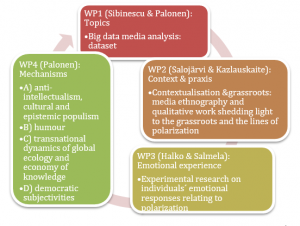WhiKnow’s trans-generational and interdisciplinary team studies polarisation in contemporary societies, identifying a ‘whirl of knowledge’ that intertwines media, politics and science. The project engages in theoretical and comparative empirical work, combining big data with qualitative and experimental research and media ethnography.
WhiKnow explores how social media hypes brokers or meaning-makers and how these produce identifications, affects and emotions in polarisation. Politicians promote polarized forms of knowledge, scientists take part in talk shows and journalists step in as politicians. A neutrally intended scientific tweet can end up in a completely different constellation – trolled and contributing to political antagonism.
It appears that the affective spin of the ‘Whirl of Knowledge’ is fueled by blending and intertwining knowledge, ‘cultural populism’, and polarizing knowledge that generates new forms of subjectivity. Affect, belief, and intimacy molds together media, politics and science, and previously distinct modes of knowledge in social media may lose their status as democracy’s control mechanisms as societies polarize.
We study how societies change through relation and transmission of knowledge. The polarised societies in East Central Europe we study are relevant for the future of Europe: Hungary, Poland, Romania, and Czech Republic. Our partners engage us in other polarised/ing societies: Belgium, Germany, Spain, Sweden, Turkey, and the UK.

Our research questions prompt our multi-level analysis:
- What topics polarize and cluster and by whom? WhiKnow first generates big data on social media to find out what polarises, where and how in spring 2019 (EP elections, Brexit).
- How do media users and producers relate to knowledge, and how do people emotionally respond to and relate to knowledge? We study how emotions work in polarized contexts through the big data but also through ethnographic research, to investigate how sharing polarized knowledge takes place on the micro level. This is followed by experimental analysis of polarized knowledge evokes emotions.
- How does polarizing or softening knowledge generate new subjectivities? Theorizing the intertwined media, politics and academia, and the role of emotions, humour, populism, transnationalism, and anti-intellectualism we investigate multi-level knowledge production.
Through WhiKnow, we hope to rearticulate the theory of hegemony for an era of social media.
